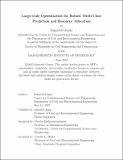| dc.contributor.advisor | Amin, Saurabh | |
| dc.contributor.author | Gupta, Samarth | |
| dc.date.accessioned | 2023-08-23T16:15:27Z | |
| dc.date.available | 2023-08-23T16:15:27Z | |
| dc.date.issued | 2023-06 | |
| dc.date.submitted | 2023-08-04T19:30:33.720Z | |
| dc.identifier.uri | https://hdl.handle.net/1721.1/151872 | |
| dc.description.abstract | In this thesis we develop optimization-based methods to deal with uncertainty arising from data, first in the context of robust multi-class prediction and second for prescriptive analytics for medical resource allocation.
In the first part, we make progress on training robust multi-class classifiers using error-correcting output codes (ECOC). We propose linear and non-linear integer programming (IP) formulations for the codebook design problem. By making connections with graph-theory such as edge-clique covering and graph-coloring, we develop tractable solutions approaches to both linear and non-linear IP formulations while maintaining low-optimality gaps, estimated using Plotkin's bound.
We provide extensive computational experiments on small class datasets including MNIST and CIFAR10. In the nominal setting, our IP-generated compact codebooks outperform commonly used large codebooks. Furthermore, in the adversarial setting, our IP-generated codebooks achieve non-trivial robustness. This is surprising due to three reasons: (1) We do not employ any {adversarial training}; (2) Most other codebooks (except Dense) do not exhibit any robustness even when they use more than twice the number of columns; (3) The robustness that we obtain is not simply because of the large network capacity. On large class datasets such as CIFAR100, Caltech-101 and Caltech-256, we leverage transfer-learning to overcome the large computational expense associated. We provide experiments under two different settings, first when the source classifier is nominally trained and second when it is adversarially trained. ECOC-based classifiers achieve better classification performance in comparison to multiclass CNNs in both settings. These experiments indicate that our large-scale discrete optimization approaches for designing ECOC-based classifiers can be extremely useful for robust operation of modern urban-systems.
In second part of this thesis we shift our focus from robust prediction to developing a new approach for prescriptive analytics.
We make progress on the problem of uncertainty informed medical resource (vaccine) allocation to a set of different sub-populations to control the spread of a pandemic such as Covid-19. Here, we tackle two major challenges: (1) To develop a principled data-driven approach to model and estimate uncertainty in the parameters of a system of ordinary differential equations (ODE) based compartmentalized epidemiological model. (2) To develop tools to solve a large-scale, non-linear optimization problem which is constrained by ODE dynamics with uncertain parameters.
We provide a data-driven approach to generate a tractable scenario set by estimating the posterior-distribution on the model parameters using Bayesian inference with Gaussian processes. Using the scenario set, we provide the nominal and stochastic (i.e. uncertainty informed) formulations for optimal vaccine allocation. We develop a parallelized solution algorithm to efficiently solve both nominal and stochastic optimization problems. Importantly, our scenario-set estimation procedure, optimization formulations and solution approach are all flexible in that they are not limited to any particular class of ODE models. We provide experiments with two different non-linear epidemiological ODE models under different setups. Our computational experiments indicate that accounting for uncertainty in key epidemiological parameters can improve the efficacy of time-critical allocation decisions by 4-8%. | |
| dc.publisher | Massachusetts Institute of Technology | |
| dc.rights | In Copyright - Educational Use Permitted | |
| dc.rights | Copyright retained by author(s) | |
| dc.rights.uri | https://rightsstatements.org/page/InC-EDU/1.0/ | |
| dc.title | Large-scale Optimization for Robust Multi-Class Prediction and Resource Allocation | |
| dc.type | Thesis | |
| dc.description.degree | Ph.D. | |
| dc.contributor.department | Massachusetts Institute of Technology. Center for Computational Science and Engineering | |
| dc.contributor.department | Massachusetts Institute of Technology. Department of Civil and Environmental Engineering | |
| mit.thesis.degree | Doctoral | |
| thesis.degree.name | Doctor of Philosophy | |
